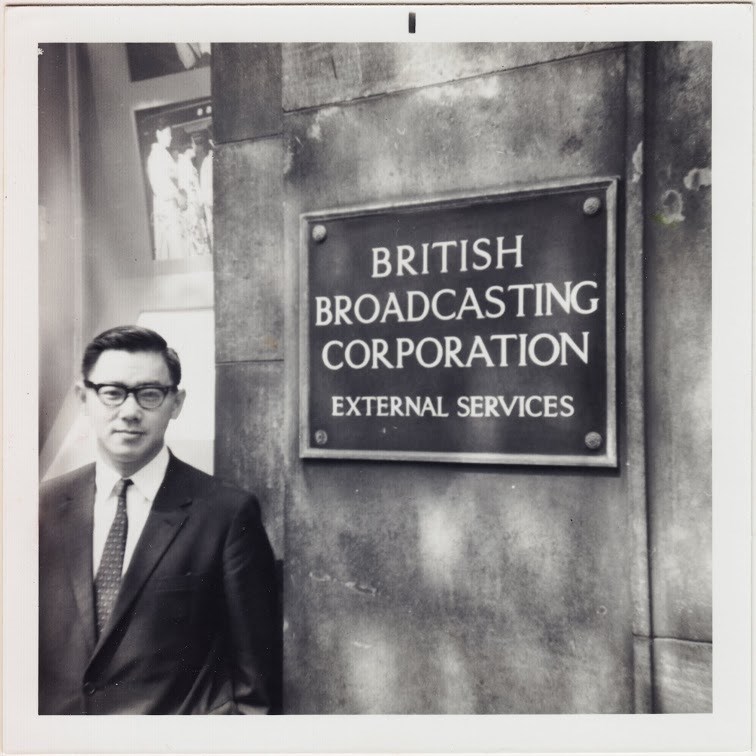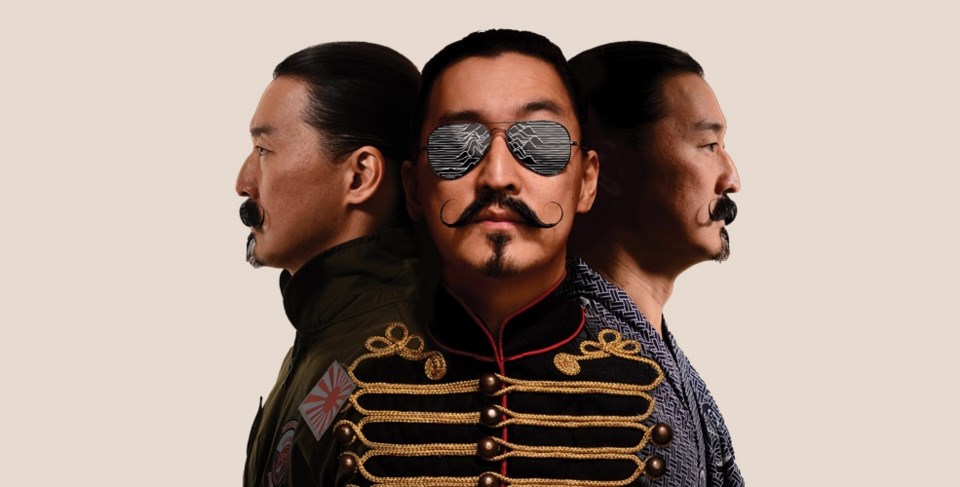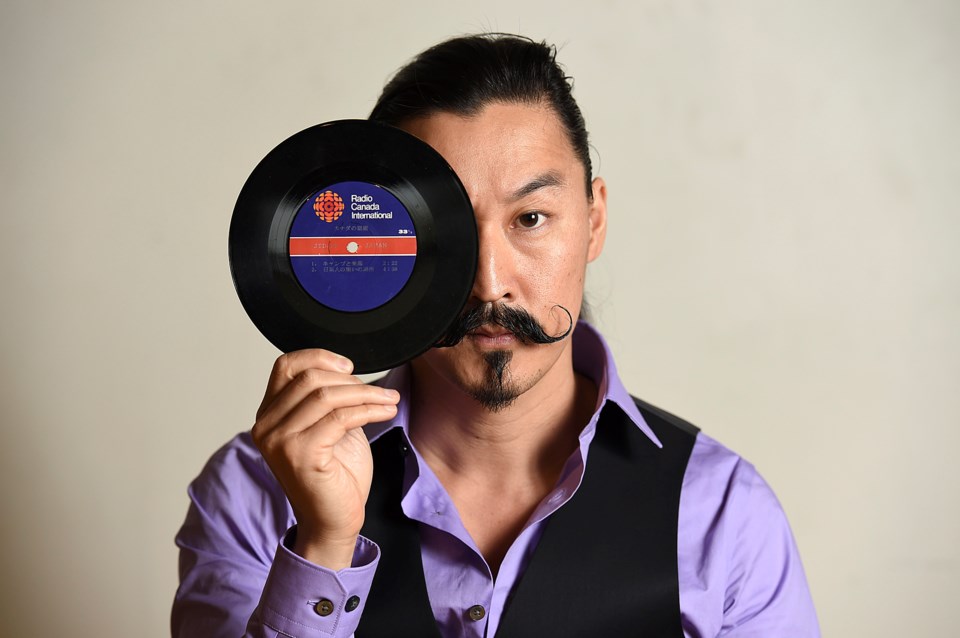Tetsuro Shigematsu is sitting at a table in his rehearsal space in Chinatown, flipping a blank page in a binder back and forth.
This is the script, he says, looking up from the book briefly. Inside the binder is a stack of paper covered in text, highlighted sections and scribbled notes, but he lingers on the blank page.
For two years, Tetsuro has been working on Empire of the Son – a one-man show about his relationship with his father. A Huffington Post columnist, award-winning writer, and former host of The Roundup on CBC, Tetsuro was the first visible minority host of a daily network radio program in Canada and has been hailed as “the voice of our Azn generation” by Ricepaper Magazine. But today his thoughts and emotions are caught up entirely in the past.
Like father, like son
Born in Japan in 1931, his father, Akira Shigematsu practiced a type of parenting made common after World War II: stoic, gruff, and aloof.
Separated by language, experiences and values, the British-born Tetsuro says their relationship was often ringed with acrimony – his father never said I love you, never cried, they never talked and never hugged – and at the centre of the rift was the two men’s startling similarities.

Both were public radio broadcasters: For years Akira transported his Japanese listeners to Canada with tales of First Nations origin stories and Cabbage Patch dolls as an announcer for the CBC’s External Services division. For the segment of Japan – the salarymen riding in crowded subways and sleeping in capsule hotels – whose fantasy of Canada was wide-open spaces and cowboys and salmon, Akira was their voice. And for a time, his show was the second highest-rated program in its category in the world – Tetsuro remembers bags of fan mail being delivered to their house. But Tetsuro also remembers the day his father’s headphones were taken away, a casualty of Mulroney-era cutbacks, and replaced with hazard-yellow ear protectors and a mail cart to push.
Tetsuro never listened to his father’s show. And yet, despite pursuing art school and comedy and “losing himself in the world”, the Vancouver-raised creative would go on to do the same thing: digesting Canada’s current affairs and quirky interests for his listeners on the CBC; romanticizing and philosophizing Canada’s banalities out of the same studio that his father once worked in.
Meanwhile, the 44-year-old Spike TV star (you can catch Tetsuro battling Vikings on Deadliest Warrior) also never said I love you, never cried, never hugged. And he was okay. He was good. All was well, he’d say, his face steady as a Kuniyoshi samurai.
When Akira’s health started failing, though, Tetsuro realized he knew nothing about his father, and that his children, Mika and Taizo, would know nothing about their grandfather. He began interviewing Akira, asking him about his experiences in pre- and post-war Japan, his time on the radio, and his own father. Having a microphone between the men bridged the silence and they began talking for the first time in their relationship.
Empire of the Son
In 1993, Tetsuro wrote Rising Son, a one-man play about his relationship with his father. At the time, it was seen by no more than 100 people, but contained ideas that would launch his career as a writer for This Hour Has 22 Minutes and pave the way for his future with the CBC.
Writing and performing Rising Son – the story of a man haunted by memories of his childhood in war-torn Japan who sees his ideals of a better life for his children subverted – would also inspire Tetsuro to study Butoh dance with Kazu Ohno in Japan and poetry with Allen Ginsberg in New York.
But Rising Son also insulted Akira. “My son makes fun of my accent for a living,” he would tell people.
It would be 20 years before Tetsuro would feel compelled to visit the subject again. This time though, he would seek his father’s blessing first.

Empire of the Son is ostensibly a play about two generations of broadcasters, a father and son, connected by blood and kept apart by the very things they have in common. It is also the story of an immigrant family and its intergenerational conflicts, as told through a blend of family video footage, audio from Akira’s old CBC recordings and interviews, and miniature worlds projected on the screen. It centres around a son’s freewill and frustration, around the small moments in their lives and the bigger picture, and around Tetsuro’s own experiences with fatherhood. Most importantly, it seeks to answer why Tetsuro never cries – something his young son asked him about around the time he stared writing the play.
Produced by Vancouver Asian Canadian Theatre and making its world premiere at the Vancity Culture Lab at The Cultch, anticipation for the show is so high that the entire original run from Oct. 6-17 sold out a week in advance and an additional five nights had to be added.
It is billed as a funny, poignant story that will blur the lines between performance art and theatre, but the play was really a way for Tetsuro to expand on his interviews with his father, to immerse himself in his research – the interviews also comprise part of his PhD candidacy at UBC – and share his father’s stories with the world.
Akira became a central figure in not only the play, but in the playwriting process – on speed dial for Tetsuro to ask questions as they arose. Tetsuro became so at ease with calling him that he was actually inspired to include live phone calls with his father as part of the play.
As they were building Empire of the Son, though, Akira’s health worsened – complications due to strokes, type 2 diabetes and Parkinson’s disease began making the timing of things uncertain, and Tetsuro, director Richard Wolfe and dramatist Heidi Taylor had to face what would happen if Akira passed away before the show. Or during the show.
They began leaving a blank page at the beginning of the script as a placeholder for what remained unwritten.
The men in black
As Tetsuro is describing all this – the changing script, the funny phone calls, the ideas of involving his father in the show – he finally stops, takes a deep wavering breath and says quietly that it can’t happen – it won’t happen – because his father passed away just days earlier, on Sept. 18.
Since the beginning of Empire of the Son, Tetsuro had been preparing for this day. Akira’s wishes were for his body to be donated to the department of Cellular and Physiological Sciences at UBC (coincidentally just down the way from where his life’s work of recordings also sits, preserved on vinyl in the university’s special collections). When the men in the white van came to the house to take his father’s body away, though, Tetsuro wasn’t ready.
Simultaneously stalling and seeking closure, he asked the undertakers if they had a few minutes to talk to him, to answer his questions about what they see every day, about death, about family. As they stood in the kitchen with his sisters and mother looking on, Tetsuro asked the two strangers – young men, half his age, in black suit pants and button down shirts with tattoos peeking out from under the sleeves – if they can tell right away if someone was loved.
They said yes; most people they see have passed away alone.
He asked them if anything about his family seems special or unique.
They said that he and his sisters seem very calm, very relaxed.
He asked them if their job ever gets to them.
One answered that he had only been doing it for four months, and that he’ll stop when he starts having dreams about it.
Tetsuro interviewed them for over an hour before finally they said they had to leave and quietly wheeled his father’s body out into the rain.
Two nights before that, Tetsuro had found himself at Akira’s side, attending to him.
As they sat there, his father resting as the medication left his body in the final stages of palliative care, Tetsuro asked him how he was doing.
He said, in Japanese, that he felt good. He was happy. And then a long silence descended once again.
“I had this impulse,” Tetsuro says of that moment. “ That I should say it. Say it now; now’s my chance. But he had never said it to me, so I just… didn’t know how.”
Instead Tetsuro settled for “Goodnight, dad, try to get some rest,” and Akira drifted off to sleep.
He never woke up again.
When Empire of the Son began, Tetsuro says he made a commitment to stay as close to the truth as possible: if his father died before opening night, they would begin at the end of his life, with the event that just happened. They would begin with the blank page.
So, as Tetsuro stares at it, that blank page marks the beginning of a play and the end of a man’s life. But perhaps it also marks the space where a father and son can finally say I love you, a space where the words aren’t really necessary – even though they’ve been there all along.
• Empire of the Son runs Oct. 6-17 and 20-24 at the Vancity Culture Lab at the Cultch (1895 Venables). Tickets from $25; TheCultch.ca.


